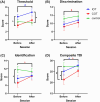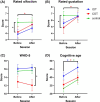Can immersive olfactory training serve as an alternative treatment for patients with smell dysfunction?
- PMID: 38863999
- PMCID: PMC11166096
- DOI: 10.1002/lio2.1270
Can immersive olfactory training serve as an alternative treatment for patients with smell dysfunction?
Abstract
Objectives: Olfactory training (OT) has emerged as a first-line therapeutic approach to the management of olfactory dysfunction. Conventional OT (COT) involves the systematic home-based exposure to four distinct odors. Previous research has demonstrated that immersive OT (IOT) involving full-body exposure to dozens of distinct odors could also improve overall olfactory function. This study compared IOT and COT in terms of efficacy.
Methods: A total of 60 patients were enrolled and assigned to three groups. The IOT group (n = 25) underwent immersive exposure to 64 odors once daily in a specialized theater. COT participants (n = 17) sniffed four typical odors in a set of four jars twice daily at home. A control group (n = 18) underwent passive observation. Olfactory function was assessed before and after training.
Results: Significant improvements in composite threshold-discrimination-identification (TDI) scores were observed after training in both the IOT (mean difference = 2.5 ± 1.1. p = .030) and COT (mean difference = 4.2 ± 1.3, p = .002) groups. No changes were observed in the control group. A significantly higher proportion of patients in the COT group (41%) presented improvements of clinical importance (TDI ≥5.5) compared to the controls (p = .018). The improvements attained in the IOT group (20%) were less pronounced (p = .38).
Conclusion: While IOT did not exhibit the same efficacy as COT in restoring olfactory function, it still demonstrated promising outcomes. Future efforts to advance olfactory recovery should focus on cross-modal integration.
Level of evidence: Level 3.
Keywords: Sniffin' Sticks; olfactory dysfunction; olfactory training.
© 2024 The Author(s). Laryngoscope Investigative Otolaryngology published by Wiley Periodicals LLC on behalf of The Triological Society.
Conflict of interest statement
No potential conflict of interest was reported.
Figures




Similar articles
-
Olfactory training ball improves adherence and olfactory outcomes in post-infectious olfactory dysfunction.Eur Arch Otorhinolaryngol. 2020 Jul;277(7):2125-2132. doi: 10.1007/s00405-020-05939-3. Epub 2020 Apr 3. Eur Arch Otorhinolaryngol. 2020. PMID: 32246254
-
Modified olfactory training in patients with postinfectious olfactory loss.Laryngoscope. 2015 Aug;125(8):1763-6. doi: 10.1002/lary.25245. Epub 2015 Jun 2. Laryngoscope. 2015. PMID: 26031472
-
Olfactory training: effects of multisensory integration, attention towards odors and physical activity.Chem Senses. 2023 Jan 1;48:bjad037. doi: 10.1093/chemse/bjad037. Chem Senses. 2023. PMID: 37715960
-
Steroids and Olfactory Training for Postviral Olfactory Dysfunction: A Systematic Review.Front Neurosci. 2021 Aug 12;15:708510. doi: 10.3389/fnins.2021.708510. eCollection 2021. Front Neurosci. 2021. PMID: 34456675 Free PMC article.
-
Olfactory Training for Postviral Olfactory Dysfunction: Systematic Review and Meta-analysis.Otolaryngol Head Neck Surg. 2021 Feb;164(2):244-254. doi: 10.1177/0194599820943550. Epub 2020 Jul 14. Otolaryngol Head Neck Surg. 2021. PMID: 32660334
References
-
- Whitcroft KL, Altundag A, Balungwe P, et al. Position paper on olfactory dysfunction: 2023. Rhinology. 2023;31:1‐108. - PubMed
-
- Hummel T, Rissom K, Reden J, Hahner A, Weidenbecher M, Huttenbrink KB. Effects of olfactory training in patients with olfactory loss. Laryngoscope. 2009;119:496‐499. - PubMed
-
- Kattar N, Do TM, Unis GD, Migneron MR, Thomas AJ, McCoul ED. Olfactory training for postviral olfactory dysfunction: systematic review and meta‐analysis. Otolaryngol Head Neck Surg. 2021;164:244‐254. - PubMed
LinkOut - more resources
Full Text Sources
Research Materials
Miscellaneous
